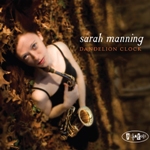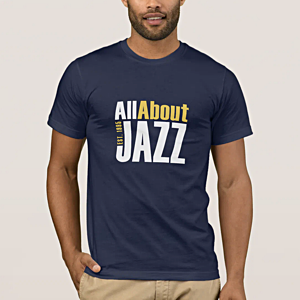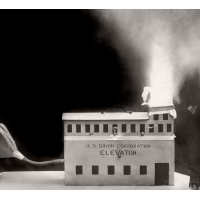Home » Jazz Articles » Interview » Fred Frith: Mapping the Further Reaches
Fred Frith: Mapping the Further Reaches
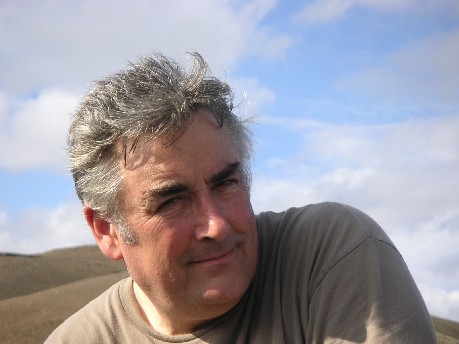
So much so, in fact, that the discontinuities between that band's albums will always be more pronounced than their continuity. Any notion of music in a state of flux that this might imply has been indicative of Frith's work in the decades since that band split up. Now that he can be realistically considered as something of a musical polymath, Frith continues to push at the boundaries even while he maps out his own singular musical territory.
All About Jazz: Even if an opinion is informed entirely by the subjective evidence of music on record, it's still apparent that Henry Cow was working a seam of that must, perhaps inevitably, be called progressive rock quite unlike anyone else. To what—if any—degree was that uniqueness the product of conscious decision making, or was the process not conscious at all?
Fred Frith: It's never really that simple, is it? The balance between having a strong sense of direction while not really having a clue what you're doing has always been kind of central to where I live musically. I think we were simply getting on with the things that interested us at the time, touched by any kind of music that we found exciting and alive. We pretty much did anything we felt like doing, and incorporated ideas from any source that seemed fruitful or interesting, musical or otherwise.
AAJ: Nearly all of the band's music on record was, until relatively Recently, put out by Virgin Records. Did the company think they were going to make money on the band?
FF: The people Richard Branson asked to run the creative side of the label were an adventurous bunch, and I think they were hoping to bring music that they liked to a broader audience. When Tubular Bells [released by Mike Oldfield in 1973] took off, it must have seemed like they were onto something. We were lucky to be able to develop in the shadow of that success, because it ensured that the adventure continued, at least for a couple of years, until Richard started to understand that this wasn't going to actually make him any serious money. But they gave us their full support for three studio LPs, and with generous conditions—meaning that we could spend unlimited time in a state of the art recording studio, and really learn how the studio worked, and how we could work in the studio. The only thing I've ever experienced that was comparable was when I recorded my first film soundtrack for Peter Mettler in the studios of the National Film Board of Canada, and they gave us six whole weeks. That, and the first three Henry Cow records, represents the longest amount of time I've ever been given to work on single projects. In the Sunrise days, we would do a whole record from conception to mix in a maximum of two weeks. Now, I'm lucky if I get one.
AAJ: In common with a great many musicians it's apparent that you haven't just arrived at a musical reference point and stuck with it. As a multi-instrumentalist, that maxim might be said to be more pronounced but how did you arrive at your vocabulary on the guitar?
 FF: I don't think I've arrived anywhere yet. I'm still traveling. I use whatever vocabulary is most suited to the conversation I'm having, and I'm certainly not interested in having the same conversation over and over again. Which means that the resources at my disposal are always (hopefully) continuing to develop and evolve, as the need arises. When you learn a language you can only become fluent by discovering who you are in that language. Music is the same for me. I have to learn who I am in whatever context I'm working.
FF: I don't think I've arrived anywhere yet. I'm still traveling. I use whatever vocabulary is most suited to the conversation I'm having, and I'm certainly not interested in having the same conversation over and over again. Which means that the resources at my disposal are always (hopefully) continuing to develop and evolve, as the need arises. When you learn a language you can only become fluent by discovering who you are in that language. Music is the same for me. I have to learn who I am in whatever context I'm working.AAJ: Precedents weren't exactly thick on the ground when you first started playing solo improvised guitar, and it's clear from the evidence on record that you had already worked out a vocabulary for that setting. Were you aware of such figures as Derek Bailey, Keith Rowe and Hans Reichel at that time, and if so, to what extent would you cite them as influences?
FF: I bought the first AMM record in 1969 and it had a big impact on me; made me listen differently. I saw Derek perform in 1971, and after Guitar Solos (Fred/ReR, 1974) came out, Hans introduced himself by sending me one of his records. Derek and Hans became good friends. Keith was more complicated because I never actually saw him perform anything except revolutionary songs until I played with him in the early '80s. My awareness of him was more political—he used to try and get Henry Cow to join the Workers Revolutionary Party, and I didn't feel very drawn to his music at that time. The person who really influenced me was none of the above, but Barre Phillips, whose first solo double-bass record set me on the path to becoming a serious improviser and also gave me a hint as to how I could approach the instrument in a "total" way.
AAJ: In common with later bands from the pre-punk and punk eras— This Heat and The Slits, for example—it could be argued that Henry Cow was political in its very being; a creative collective, to be sure. To what extent was there continuity between the band's musical and social outlook, and did one flow inevitably from the other?
 Cosa Brava, from left: Carla Kihlstedt, Fred Frith, Matthias Bossi, Zeena Parkins
Cosa Brava, from left: Carla Kihlstedt, Fred Frith, Matthias Bossi, Zeena Parkins FF: It was all pretty much permanently intertwined and in a constant state of flux. We argued constantly and about everything—musical, social, political...gastronomic! Sometimes the arguments were friendly and constructive and sometimes they were neurotic and personal, and sometimes rather desperate. I've no idea how we were able to sustain our energy for so long, except that we were almost psychotically creative. Seeing the DVD from Switzerland that we released as part of the box set was a revelation to me—I remember it as a very dark period in our life, tense and nerve-wracking—and yet the energy fairly crackles off the screen, and we're unbelievably tight. It was reassuring. In the end, all you can say is that we couldn't really have done it any other way than creative collectivity, musical and political engagement of the broadest kind, and a large helping of love and respect when the wind was blowing in the right direction.
AAJ: Georgie Born [bassist with Henry Cow in the band's latter days] has gone on record identifying the mid-1970s as "a darkly fecund era in the soul of British culture." Although it's pretty apparent what has happened politically in the intervening years, can you think of some present day examples of collective action in musicmaking you can empathize with in that regard?
FF: Well, AACM is still going strong, and I have the deepest admiration for Muhal Richard Abrams and the movement he started, for example. Actually, I see communities of like-minded musicians and sound artists springing up all over the place, and it's not so much about "bands" as about united fronts...
AAJ: One of the things that is now a hallmark of your work is your willingness to diversify and not simply to straddle the divide between composition and improvisation. Has this resulted in you considering music more as a whole or in having an appreciation for labels or compartmentalizing?
FF: Labels are useful up to a point. They give a general idea about certain kinds of commonalities, but I suspect that they're often more an identifier of the people who are on the receiving end than the ones who are busy doing it. When I hear the words "progressive rock" I think first of the people who identify themselves as "progressive rock" fans. I've always done a lot of different things and all my musical activities tend to inform each other in various ways. Sometimes I'm more involved in one kind of activity, sometimes in another. And sure, it makes up a "whole" when considered as an accumulation of things that I do and have done. But music is an impossibly rich and diverse field, constantly mutating and developing and changing. Even if you come up with a useful label it will already have spawned sub-categories by tomorrow. You can't be hip any more by knowing the latest thing because it's already over.
AAJ: Has working with a rock band [Cosa Brava], decades after the Henry Cow split, provoked the remembrance of things past or does it mark another step on the way? Perhaps it's a mixture of both?
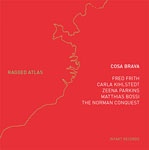 FF: Everything I do is as likely as not to invoke remembrance of things past. How could it not? All music is about memory. And don't forget that I have been involved in a lot of bands since Henry Cow: Aksak Maboul [1979], Art Bears [1979-81], Skeleton Crew [1982-86], Keep the Dog [1989-92], The FF Guitar Quartet [1996-99], Tense Serenity [1996-97], Massacre [1980-82 and 1998-present]. Cosa Brava is part of a continuum that exists long past Henry Cow days. It's actually a very different kind of experience. All the musicians in Cosa Brava read music fluently, as well as having a rock attitude to putting together songs, and it's that particular combination that makes what we do possible, the idea of composing parts in the way I would for a classical ensemble, knowing that they can be performed at a very high level, while simultaneously containing the seeds of their own deconstruction. That approach began with the Guitar Quartet—well, it began with Henry Cow really—but in a way we were positing the electric guitar as a classical ensemble and now, of course, there are lots of electric guitar ensembles, so it obviously worked. Cosa Brava is not referential in the same way. For me the central focus of the group is melodic and narrative.
FF: Everything I do is as likely as not to invoke remembrance of things past. How could it not? All music is about memory. And don't forget that I have been involved in a lot of bands since Henry Cow: Aksak Maboul [1979], Art Bears [1979-81], Skeleton Crew [1982-86], Keep the Dog [1989-92], The FF Guitar Quartet [1996-99], Tense Serenity [1996-97], Massacre [1980-82 and 1998-present]. Cosa Brava is part of a continuum that exists long past Henry Cow days. It's actually a very different kind of experience. All the musicians in Cosa Brava read music fluently, as well as having a rock attitude to putting together songs, and it's that particular combination that makes what we do possible, the idea of composing parts in the way I would for a classical ensemble, knowing that they can be performed at a very high level, while simultaneously containing the seeds of their own deconstruction. That approach began with the Guitar Quartet—well, it began with Henry Cow really—but in a way we were positing the electric guitar as a classical ensemble and now, of course, there are lots of electric guitar ensembles, so it obviously worked. Cosa Brava is not referential in the same way. For me the central focus of the group is melodic and narrative.AAJ: How does solo improvisation compare with working in a group? Presumably there can be continuity between the two despite the very different demands of setting.
FF: I view them very differently, on the level of theater as much as anything. Being alone in front of an audience is a very different kind of experience for both parties. And your relationship with the material is different. There is nobody to have a musical conversation with, so obviously it changes your attitude to vocabulary, to take up where we left off before...
AAJ: Amongst other things in the course of your musical life you've been given the opportunity to compose for the Rova Saxophone Quartet and Ensemble Modern. In the same way as with your work as a solo improviser and with groups, is it easy to reconcile the specific discipline of composition with the different preoccupations and discipline of the improviser?
 Art Bears Songbook, from left: Zeena Parkins (hidden), Julia Eisenberg Kristin Slipp, Chris Cutler, Fred Frith, Carla Kihlstedt
Art Bears Songbook, from left: Zeena Parkins (hidden), Julia Eisenberg Kristin Slipp, Chris Cutler, Fred Frith, Carla KihlstedtFF: It was very fortunate for me that I began to write for others with ROVA, because I knew them pretty well already, and they are all stellar improvisers, so there wasn't anything to reconcile—they already had a very good understanding of the territory in both cases and indeed were precisely interested in the points where the two disciplines intersect. I've written some of my best work for them because of that fact.
Ensemble Modern was a different story. They had and still have very little collective experience of improvisation and are, for the most part, rather suspicious of it—even if there were and are some very good individual improvisers in the group; the late Wolfgang Stryi being, of course, one of them, and I miss him. My approach to writing for them was quite different, balanced between what I wanted to learn from them as a composer and what they wanted to learn from me as an improviser. It finally was very successful—our recording won awards—but it wasn't an easy process, and I probably ended up getting more out of it than they did. I've been able to apply what I learned to other composing projects with other classical ensembles but somehow I don't think they've done much improvising since Traffic Continues (Winter and Winter, 2000). Whatever the truth of the matter, it was a wonderful opportunity for me to enter into a world I didn't have much direct experience of. They're fantastic musicians, and were very welcoming, which I've always appreciated.
In the end it's all about people—I like to work with people, not instruments, which means that the most important thing is to develop deep working relationships with musicians you trust, and who trust you, without either of you necessarily knowing where you're going. And the same is true whether the music is improvised or composed, or however else you want to describe it. I feel it when I'm working with Cosa Brava, and also with Arditti Quartet, and it's what makes life exciting and fulfilling.
AAJ: Given that you hold down an academic post (professor of composition at Mills College in Oakland, Calif.), would it be true to say that you've found all the musical contexts you've worked in to be equally stimulating and do you hope that things will stay that way in the future?
FF: Not equally stimulating—that would be a tall order—but if I'm learning something then it's all good, in the end, right? I love teaching at Mills, partly because of its history of support for and investment in experimental approaches—the fact that Henry Cowell, Harry Partch, Lou Harrison, John Cage, Terry Riley, Steve Reich, Xenakis, Berio, Pauline Oliveros, Anthony Braxton, Alvin Curran and so many others have passed through here tells its own story—but mostly because of the students who come here, who tend to be the kinds of musicians and sound artists who don't quite fit anywhere else, and who come from all over the world to be here. That makes for a stimulating community to say the least.
AAJ: Has your association with Mills College been a happy and fruitful one?
FF: My colleagues and I are stretched pretty thin sometimes but it's been a very good 10 years, and I consider myself lucky and privileged to be here, to hear so much great work, and to get a glimpse of what the future of music will look like. So, yes, absolutely.
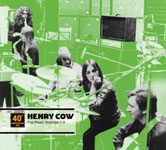 AAJ: It could be argued that, as a band, Henry Cow was fortunate in getting Dagmar Krause as a singer. How important is it for you that a musician or singer has a distinct identity? If indeed it is important can you give some examples of people whose work you admire in this regard outside of those you've already recorded with?
AAJ: It could be argued that, as a band, Henry Cow was fortunate in getting Dagmar Krause as a singer. How important is it for you that a musician or singer has a distinct identity? If indeed it is important can you give some examples of people whose work you admire in this regard outside of those you've already recorded with?FF: I don't know of any musician who doesn't have a distinct identity though they may not always be in touch with it.
AAJ: Given that you play a variety of instruments, to what extent are you aware of their different characters and sonorities and to what extent does such knowledge inform how you utilize them?
FF: Very aware, and it informs my use of them profoundly.
AAJ: With particular reference to your work as an improviser, how important is the passing moment to you? Is it important that, to use the Beckett maxim, you leave a stain upon the silence?
FF: Improvising is impossible without being constantly in the moment. Beckett also said "Some soft thing softly stirring soon to stir no more," which is kind of a similar idea...
AAJ: Do you feel as engaged as you have at any other arbitrary point in your career with the mechanics of making music? As someone who it seems has consciously concerned himself specifically with the vocabulary of the guitar, to what extent is this still the case, if indeed it ever has been?

FF: I'm fascinated with acoustic guitar right now, after making To Sail To Sail (Tzadik, 2008). I feel as if I have a lot of work to do to understand it, to get to grips with the possibilities. But in the end the mechanics is always less interesting than what is being expressed.
AAJ: Would you say that modernism is still a sustainable proposition in the sense that music can perpetually be seen to be moving forward, as opposed to being merely a rehash of what's gone before?
FF: I resist binary comparisons whenever possible. We accumulate and accumulate—post-modernism didn't replace modernism, it coexists with it, presents another angle of attack. If you're alive and aware you need to be engaged with both and with everything else as well.
Selected Discography
Cosa Brava, Ragged Atlas (Intakt, 2010)
Fred Frith, Nowhere / Sideshow / Thin Air (Fred/ReR, 2009)
Fred Frith/Arte Quartett, The Big Picture (Intakt, 2009)
Fred Frith/Arte Quartett, Still Urban (Intakt, 2009)
Henry Cow, The 40th Anniversary Henry Cow Box Set (ReR Megacorp, 2009)
Fred Frith, The Happy End Problem (Fred/ReR, 2008)
Fred Frith, To Sail To Sail (Tzadik, 2008)
Fred Frith, Eleventh Hour (Winter and Winter, 2005)
Fred Frith, Clearing (Tzadik, 2001)
Fred Frith/Ensemble Modern, Traffic Continues (Winter and Winter, 2000)
Fred Frith Guitar Quartet, Ayaya Moses (Ambiances Magnétiques, 1997)
Massacre, Killing Time (Celluloid Records, 1981)
Fred Frith, Gravity (Ralph Records, 1980)
Henry Cow, Western Culture (Broadcast, 1979)
Art Bears, Hopes and Fears (Recommended Records, 1978)
Fred Frith, Guitar Solos (Caroline Records, 1974)
Henry Cow, Unrest (Virgin Records, 1974)
Photo credits
Page 1: Heike Liss, courtesy of Fred Frith
Pages 2, 3: Martin Morisette
Page 4: Frank Rubolino
Featured Story: Nick de Pencier
Tags
Fred Frith
Interview
Nic Jones
Henry Cow
Derek Bailey
Keith Rowe
Hans Reichel
Barre Phillips
Muhal Richard Abrams
Henry Cowell
Harry Partch
Lou Harrison
John Cage
Terry Riley
Steve Reich
anthony braxton
PREVIOUS / NEXT
Fred Frith Concerts
Feb
17
Tue
Support All About Jazz
 All About Jazz has been a pillar of jazz since 1995, championing it as an art form and, more importantly, supporting the musicians who make it. Our enduring commitment has made "AAJ" one of the most culturally important websites of its kind, read by hundreds of thousands of fans, musicians and industry figures every month.
All About Jazz has been a pillar of jazz since 1995, championing it as an art form and, more importantly, supporting the musicians who make it. Our enduring commitment has made "AAJ" one of the most culturally important websites of its kind, read by hundreds of thousands of fans, musicians and industry figures every month.



